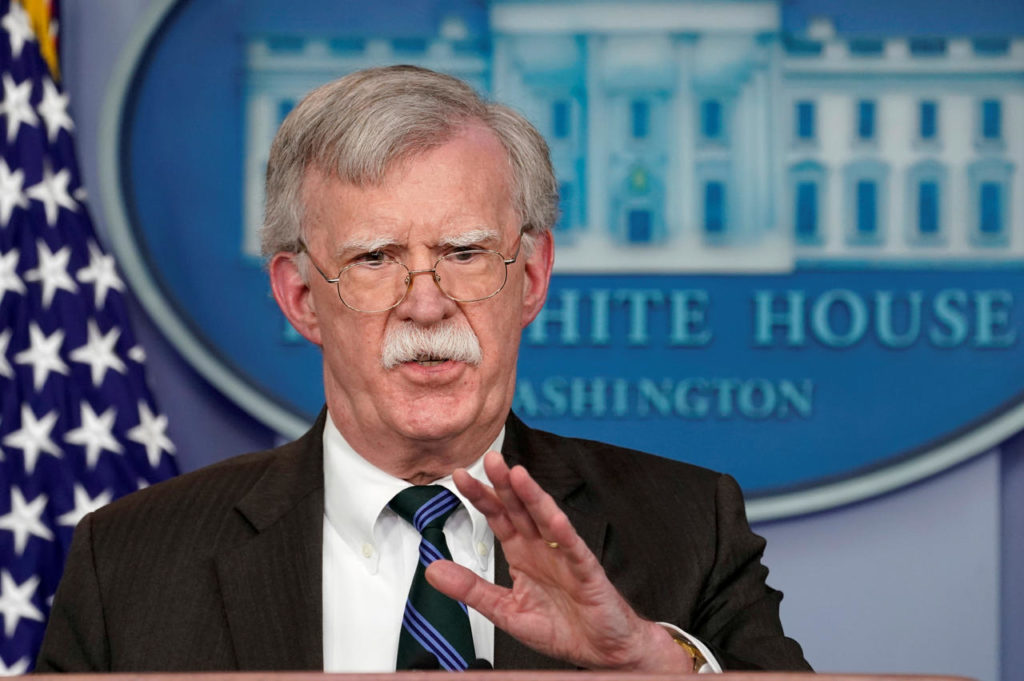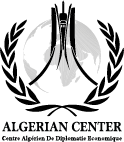Les conflits au Sahel, le Sahara Occidental et les relations Algéro-Américaines – Entretien avec l’Ambassadeur John Bolton, Ancien Conseiller à la Sécurité Nationale des États Unis

Entretien publié le 31 Janvier 2021
Centre Algérien de la Diplomatie Économique : Ambassador, you have served as the United States Assistant Attorney General for President Ronald Reagan, you worked for the Bush administrations, and finally, as ONE OF THE MORE HIGH-PROFILE FORMER MEMBERS of former president, Donald Trump’s administration, where you served as the National security advisor. you were previously the U.S. ambassador to the United Nations and recently the author of The Room Where It Happened: A White House Memoir.
Ambassador, John Bolton, given your strong background regarding international security we would love to have a lengthy conversation with you in various areas, however, time will not allow us to do that so let me jump to the first question . If you can briefly describe the current situation in North Africa, more specifically in the Sahel region where The situation is increasingly becoming a complex humanitarian crisis?
Amb. John Bolton : I think there are obviously a number of difficulties that the Sahelian nation face and this is true across really much of North Africa from the Atlantic all the way to the Egyptian border obviously the civil conflict in Libya is continuing without much prospect of a solution it has produced refugee flows into Europe and in North Africa, there are other difficulties as well and the conflict in Western Sahara now has reached a new point of a grave danger and it’s one of the reasons that I thought the Trump administration made a mistake to recognize the Moroccan claim of sovereignty over Western Sahara it’s obviously not a claim that has been validated by the referendum that was promised to the Sahrawi people in the 1991 and never given to them and the this is a had gone to cause more tension and danger in North Africa and the Sahel precisely at the moment when we should be trying to resolve these issues and the bring stability back.
CADE : Border countries with Algeria such as Mali, Niger, and Libya are constantly under major threats such as terrorist risks., how can the US-Algerian securities co-operate to solve and help end the ongoing security crisis in your opinion? And what about the aforementioned countries, how they are supposed to help mitigate or end this crisis ?
Amb. John Bolton : Well I think that the terrorist threat remains very serious and I think it was another mistake of the trump administration to reduce the capabilities of the US African command or AFRICOM and to look to reduce the presence of AFRICOM in North Africa across-the-board because I think that there were with Mali and Niger in particular and Mauritania there is a excellent counterterrorism cooperation and I think that might be reduced I think we should be increasing counterterrorism cooperation with Algeria and I think all of us obviously have a common desire to to see the situation in Libya resolved and we’ve got the a parties that are intervening in this civil wars become a surrogate struggle with outside forces and advisor’s involved, the Russians the Turks and others from the region that’s obviously not going to reduce the threat from Libya and it’s not going to make it unattractive for Terorist groups and others who would use it as a base of operations so the anarchy and Libya is a terrible situation for the people of Libya to begin with it poses the risk of terrorists’ threats worldwide but especially is destabilizing other countries in the region who face of threats and dangers inside their own borders from the situation in Libya that they can’t control ….
CADE : The United States ensures that the decisions of the United Nations are respected everywhere in the world. Many countries consider President Trump’s decisions as a violation of international law and the decisions of the UN Security Council. You have firmly responded to his decisions and statements and I quote, one of your responses, President Trump’s decision-making » does not produce a coherent, effective, sustained policy. »
One example for that is the Western Sahara case in specific that has always been in the hands of the United Nations,
Not so long ago, former US President Trump made a proclamation that the United States would recognize Moroccan sovereignty over Western Sahara.
What is your opinion on this decision?
Is former President Trump’s décision irreversible? can it be revoked by president Biden or the other institutions (congress or SCOTUS)?
Amb. John Bolton : President trump’s decision was a mistake it does not reflect long-standing American policy I think the incoming Biden administration has already said it will review the Recognition of Maroccan sovereignty and I think it can be overturned I think the Moroccan decision to extend full diplomatic relations to Israel and vice versa it was the correct decision. I think in fact Morocco had come very close to doing that in the 1990s and there surely has been a nonpublic discourse between Morocco and Israel for some time so I don’t think Morocco would have given anything up simply to a recognized Israel as the United Arab Emirates and Bahrain did, Sudan has. This concession to Morocco’s insistence on its position in Western Sahara who had nothing whatever to do with the exchange of diplomatic relations with Israel. Now, on the western Sahara itself you know I helped write the security council resolution in 1991 that set up MINURSO the UN mission for the referendum in the Western Sahara and by its very name the purpose of admission was not simply to monitor the ceasefire between Polisario and the government of Morocco but to conduct the referendum that was the idea to resolve the status of the Western Sahara territory which had been contested since the end of the Spanish colonial rule in1975 and I remember very distinctly this is in the Spring of 1991 we thought this could not be very hard to do, how hard can it be to have a referendum when we know from the Spanish senses that it was going to be used we were talking about maybe 80 or 90,000 potential voters that we thought we could have that done by 1992 and yet we found that as soon as the fall of 1991 the Moroccans were making it impossible for MINURSO to validate the Spanish senses to register the voters to take the necessary steps to prepare to conduct the vote and that pattern that began within months of the creation of MINURSO has continued right until the present day and there have been many efforts to get Morocco to live up to what it agreed to do when the MINURSO was created when the security council adopted the resolution which is allow the UN to conduct the referendum. You know I came back as a volunteer to help James Baker in 1997 when he became the secretary general’s personal envoy on Western Sahara and James Baker worked very hard during all of 1997 until we reached what we called the Houston accords where again Morocco committed on ambiguously to having a referendum and then they have obstructed it again. Baker actually came back one more time I had by that time myself gotten to the George W. Bush administration but Baker continued as a personal envoy and made many efforts since that time. So, this is a long-standing policy of the United States that the status of Western Sahara and the return of the Sahrawi refugees after a free and fair referendum was basic American policy we did not recognize Moroccan sovereignty over the territory and as we believe sovereignty comes from the people and the people of Western Sahara should have had the opportunity to decide for themselves what they wanted to be and independence was for them then and is now a critical choice which Morocco has denied to them. So I just think the whole thing is an example of close to 30 years of UN failure to do something that everybody had agreed to in 1991. Now faced with the Trump administration’s reversal of that longstanding US policy, The Biden administration has said it will review what happened and come up with its conclusion. I think it’s very important I assume Algeria is in touch with the state department and others in the Biden administration working on this I think for all of the regional countries the African Union as a whole to make it clear that the morocco is very isolated on this position and that if they insist on continuing their control over the Western Sahara and they’ve got control of roughly 2/3 of the territory behind the berm that they built that they’re risking a real instability in North West Africa the Polisario would be prepared to return the military activity, I think they already made their position on that clear and that the Moroccan position is going to lead to more trouble in violation of the commitment they made to hold the referendum.
CADE : Algeria is a strategic security partner for the United States in the region. It has always supported the liberation movements and the right of peoples to self-determination، Freely and without outside interference Trump’s latest announcement was not expected for all the supporters of the Western Sahara cause. How do you see the impact of such a declaration on US-Algerian relations to be more specific?
Amb. John Bolton : Well as far as I know and I’m I could be corrected but as far as I know, there is no advance consultation by the US government with the government of Algeria or Mauritania or anybody other than Morocco certainly not with the Polisario in Tindouf and that’s not the way you conduct diplomacy as you were saying we’ve got excellent cooperative relationships with Algeria on a whole range of issues it is a strategic partner we all want stability in northwest Africa and the Mediterranean region and to have this a 180゚ reversal of a longstanding US policy was no consultation is not a good idea no matter what the issue is but particularly when it’s an issue that affects Algeria’s national security as much as it does. So I think it was a grave mistake in many respects and I hope that It doesn’t have a lasting negative effect on US-Algerian relations I assume The Biden administration will understand that fully, and that’s why I think that if they act quickly and I think it is important that they act quickly to reverse the recognition of Moroccan sovereignty we can put things back on even keel, now I would say and I said this when I was national security adviser and I said it before that now say it after that, we have had nearly 3 decades go by where Morocco has prevented the United Nations from holding a referendum for the people of the territory and decide what their future is and the cease fire that’s part of the MINURSO formula is not the only reason MINURSO exist it’s not the primary reason; the primary reason is for the are in MINURSO’s name is to hold a referendum and if there’s not going to be a referendum if that’s Morocco’s position and I don’t know how to describe it any other way they don’t want a referendum then they shouldn’t have a cease fire the UN can’t become a party to the dispute and yet by upholding the cease fire and preventing the referendum it’s taking morocco’s side. Now I don’t want to see I still at least in Northwest Africa I want a peaceful resolution to this but I don’t see how you continue doing the same thing over and over again for 30 years not achieving the result that was intended at the beginning and just keep doing it otherwise will come back in 30 years and it will look exactly the same and the and that’s a waste of resources it’s terribly unfair to all the parties involved and it’s particularly unfair the Sahrawi who want nothing other than to be able to vote on who gets the governor…
CADE : Given the United Nations peacekeeping mission in Western Sahara, MINURSO. * Could you provide us a mapping of the key actors needed to resolve the Western Sahara affair?
Amb. Bolton : During Secretary Baker’s negotiations in 1997 in Houston and we were in other places, in Portugal and Britain and a number of countries participated because they wanted to see the matter resolved. He was insisting that we have Morocco Algeria Mauritania and the Polisario all agree on the outcome because these were the of the 3 countries and the Sahrawi people who were most directly involved in this but he also spent a considerable amount of time trying to get Spain and also France to do their duty as former colonial powers who had helped create the situation in the 1st place to step up and support the referendum I think the record of the Spanish government basically is pretty good but I’d have to say with all due respect to our friends in Paris the French did not stand up and they should have and they should have said you know, we believe in democratic government and that starts with people being able to exercise self determination so I think Europe needs to have a stronger view and favor of the of the referendum I think the US policy should be clear I and I think Baker was exactly right in saying that the the 3 most-affected countries and the Sahraoui needed to be central actors in making this referendum happen.
CADE: What are your expectations regarding the new administration’s priorities concerning areas where conflicts are still active ?
Amb. Bolton : Biden was elected after a campaign where there is very little debate on national security issues and that’s unfortunate in many respects because President Biden was not really forced to lay out in specific terms what his priorities were in a range of national security question so it is still within one week of the administration being inaugurated but there is much that we don’t know and I think it will be a considerable subject of debate in the United States from the great strategic questions of how to deal with China and Russia to the threats of proliferation of weapons of mass destruction the threat of terrorism and the resolution of regional conflicts but these are all very important and I think there will be a lot of attention to how the Biden administration pursues resolution of some of these issues.
CADE : Ambassador Bolton, it was a pleasure having you with us today at the Algerian center for economic diplomacy! Thank you.
Amb. Bolton : Thank you very much for inviting me. I’d love to return to Algeria one day, I have had the pleasure of being there several times but not many years and talk about this and other issues of mutual concern thank you again for having me.
Entretien réalisé par l’équipe du Centre Algérien de Diplomatie Economique.



